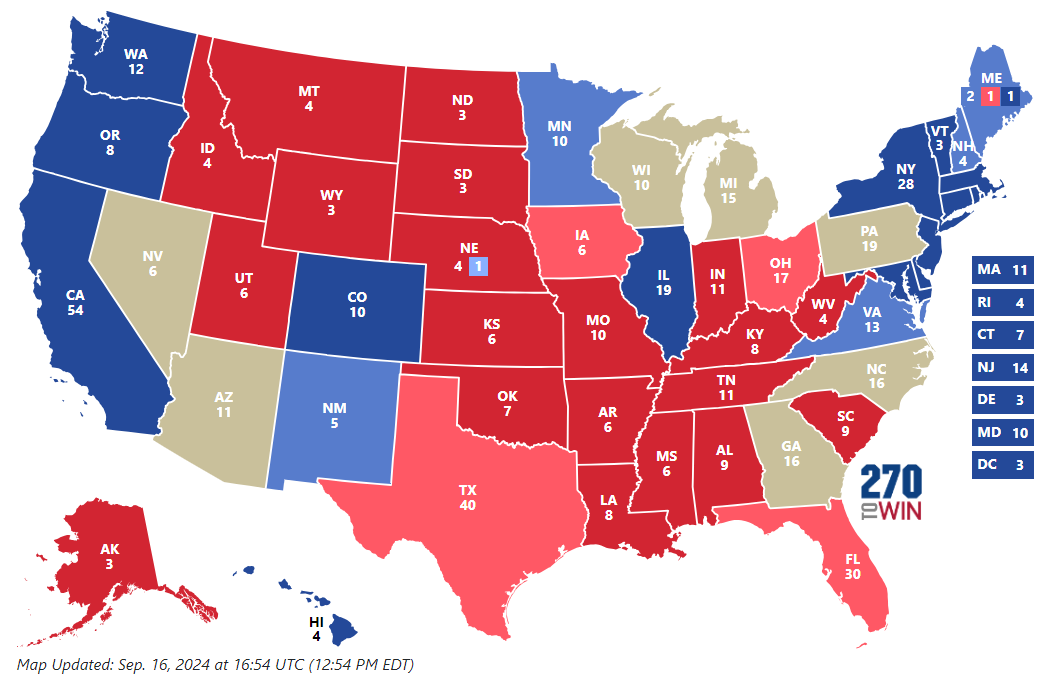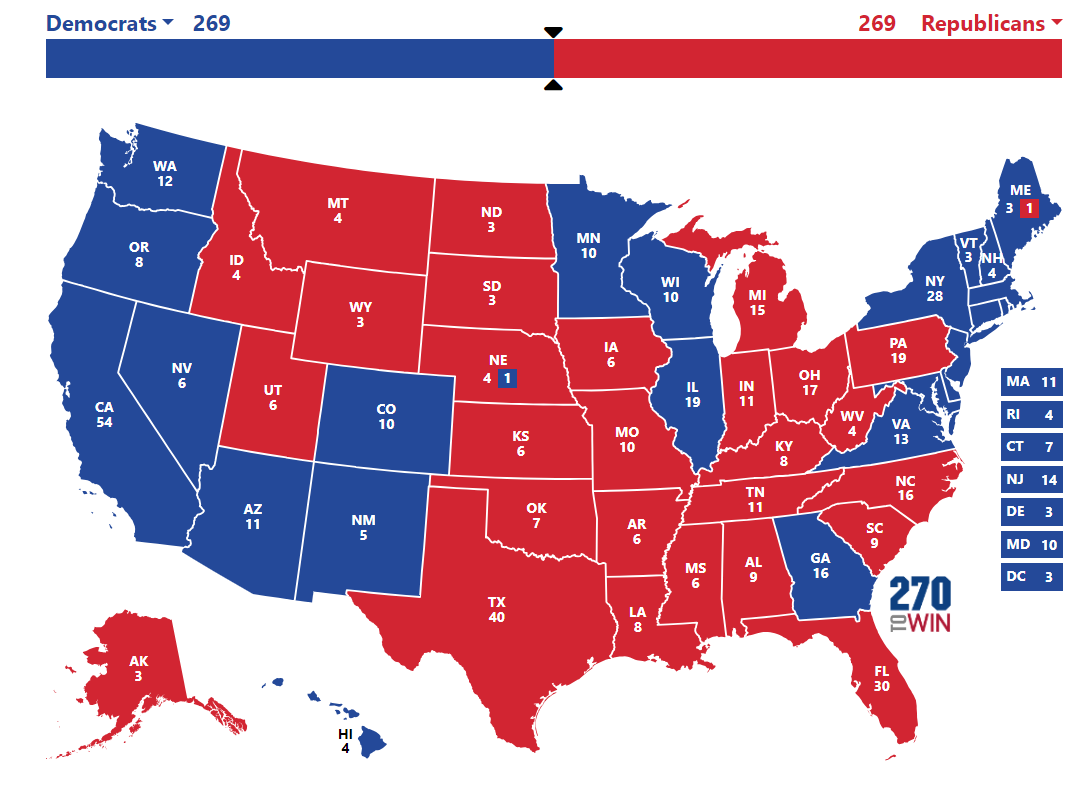An Electoral Tie: It Could Happen, But What Happens If It Does?

The 2024 presidential election is considered extremely tight and much like the 2020 election will be decided by less than 100,000 votes in a small handful of states – if polling is any indication of the state of the election.
The 538 national polling average has Vice President Kamala Harris at 48.3% to Donald Trump’s 45.6%, a gap of 2.7 points. The margins have shrunk for Harris since late August following independent candidate Robert F Kennedy Jr’s departure from the race.
But her numbers have also climbed – as have Trump’s.
While there is increasing skepticism over the accuracy and reliability of polls, particularly since the 2016 election when Hillary Clinton was given an 80% chance of winning, presidential elections have been defined by who can turn out the vote in the right states.
Harris will likely win the national popular vote. But that won’t mean anything if she cannot win the popular vote in states like Arizona, Georgia, Michigan, North Carolina, Pennsylvania, and/or Wisconsin.
Neither Trump nor Harris needs all of these states, but Harris flipping North Carolina or Trump getting the edge in Pennsylvania can mean the difference between victory and defeat – and as the campaigns do the electoral math, one scenario remains a possibility:
The US could see its first tie in the Electoral College. So, what happens then?
The Framers of the Constitution Prepared for This Possibility
There is a contingency measure in the US Constitution in the event that no presidential candidate reaches the coveted 270 electoral threshold to win a presidential election. This includes if there is a 269-269 tie (which is possible).
Article II, Section 1 of the US Constitution states:
“The person having the greatest number of votes shall be the President, if such number be a majority of the whole number of electors appointed; and if there be more than one who have such majority, and have an equal number of votes, then the House of Representatives shall immediately choose by ballot one of them for President; and if no person have a majority, then from the five highest on the list the said House shall in like manner choose the President. But in choosing the President, the votes shall be taken by States.”
This scenario would benefit Trump, and here’s why.
Article II goes on to say that the congressional delegation from each state will have one vote, which means it doesn’t necessarily matter who has the majority in the House, but who controls the most states.
For example, Democrats had a 222-213 majority in January 2021. However, if Joe Biden and then-President Trump had a tied electoral count then Trump would likely have been elected by the House to be president.
This is because the GOP controlled the congressional delegation of 27 states. Republicans only lost one state in the 2022 midterms – Alaska – so they still hold on to a slim majority of states.
This could change after the 2024 elections, but right now this scenario favors Trump.
The House, however, does not have the authority to elect a presidential ticket in the event of an electoral tie – only the president. Article II gives the Senate the authority to decide the vice president.
It’s an interesting conundrum when control over Congress is divided between the two parties. There are additional stipulations laid out in the Twelfth Amendment and the Twentieth Amendment.
It’s Likely We Won’t Know the Full Results on Election Night
Putting aside any potential legal challenges to the results in various states, which voters should expect, the results people see on election night will likely not be the final results in some of the critical battleground states that will decide the election.
While the use of absentee ballots will not look like it did during the COVID-19 pandemic in 2020, an election that comes down to the margins could mean that absentee ballots dated on Election Day in some states may be what decides the election.
And in Georgia, the state elections board voted to require a hand count of the ballots which will significantly slow down the counting process. A final tally may not be known until days after the election.
The results people hear on election night or even days after Election Day are projected results. The results are not official until the electors appointed to the Electoral College meet and cast their votes for president, which will occur on the third Monday of December.
The Rogue Elector?
Rogue electors, or faithless electors, are possible but rare.
These are electors who would break from the popular vote of their state and vote their conscience, which the Supreme Court ruled is illegal if their state explicitly requires electors to be bound to the state’s popular vote.
Roughly half of US states have laws that require electors to vote in accordance with the state popular vote. This means it is not impossible for electors to act against the will of voters in states that do not bar faithless electors, but still unlikely.
Electors are chosen by the winning party in each state. Their incentive is to always toe the party line. So even if there were rogue electors (In 2016 there were 7), unless they voted for the other side’s nominee, the election would still go to the House in the event of a tie.
What Are the Odds of a Tie?
A tie has never occurred in the history of the Electoral College. There are a small number of combinations in the vast number of electoral possibilities that could produce a tie. For example, look at the current 270towin map:

If the leaning states were filled in for the party they currently favor, this is the type of scenario that would lead to a tie:

It’s not an impossible scenario, especially when current polling in Arizona, Michigan, Pennsylvania, and Wisconsin is so close. But Harris would have to defy current polling in Georgia to make this happen.
Trump could take one more electoral vote in Nebraska or Harris could take Maine’s 2nd Congressional District and the electoral count would produce a winner. In the end, there are far more scenarios that seem likely over a tie
 Shawn Griffiths
Shawn Griffiths







